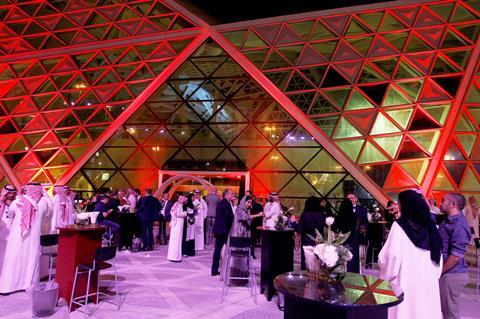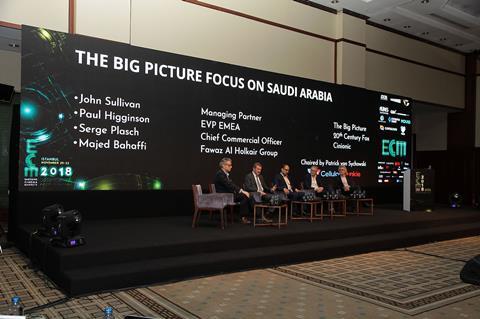While current political issues have cast a cloud over Saudi Arabia’s international reputation, economic plans in which cinemas will play a key role remain on course. Screen reports from Istanbul’s Emerging Cinema Markets Conference.

With a population of 32 million, robust national wealth and its unique status as the only G20 economy without multiplex cinemas, Saudi Arabia has long represented one of the most tempting untapped markets for the exhibition industry. And so the kingdom’s 2017 announcement that it was ready to end the 35-year ban on cinemas immediately caught the sector’s attention. AMC opened a single-screen venue in April 2018 in a converted Riyadh concert hall, and the Dubai-based Vox Cinemas quickly followed with a four-screen site situated in a family entertainment centre, also in Riyadh.
The likely impact of this sudden U-turn in Saudi Arabia — which is branded Vision 2030 and is part of the National Transformation Plan to restructure the economy in an age of cheap oil — came under the spotlight at the inaugural Emerging Cinema Markets (ECM) conference, held in Istanbul on November 20-22 and presented by DCS Events in association with cinema consultants The Big Picture.
Germany or Singapore?
The headline session was called ‘The Big Picture Focus on Saudi Arabia: Vision 2030’. It closed a conference that had earlier looked at emerging cinema markets in Nigeria and Portuguese-speaking Angola and Mozambique; the state of cinema in host nation Turkey; and how digital technology has transformed censorship of risqué screen content for conservative-minded Muslim nations.
Panellist and leisure consultant John Sullivan of The Big Picture, who has also worked with Village Roadshow and Warner Village and is a director of the UK-based Light Cinemas chain, set the scene with an analysis of key territories across the globe. “Will Saudi Arabia be Germany or Singapore?” he pondered, with reference to the disappointing data from the European Union’s most-populous nation, which has a relatively high screen density of 5.8 per 100,000 inhabitants but low annual admissions of 1.5 per person. In contrast, Singapore has 4.4 cinema screens per 100,000 inhabitants and 3.4 annual cinema visits per head.
Sullivan questioned Saudi Arabia’s ambitious targets of 300 cinemas with more than 2,500 screens, delivering $1bn at the box office by 2030. But this view was countered by fellow panellist Majed Bahaffi, development director at Saudi shopping mall empire Fawaz Al Hokair Group. “Visions are supposed to be challenging,” Bahaffi said. “It is realistic that cinemas will play a vital role, not just in diversifying the economy, but just having people entertained. The youth in the country appreciate cinemas opening in Saudi very much.”
The Fawaz Al Hokair Group is already planning to retrofit current malls in its portfolio. “Upcoming malls obviously will cater for cinemas,” said Bahaffi.
Panellist Serge Plasch, chief commercial officer at Barco joint venture Cinionic, which is currently the sole provider of cinema projectors in Saudi Arabia, took encouragement from the fact “all the exhibitors entering the market have at least 10 years’ experience in the industry, or have been well-advised”.
“All the external players have connected with strong local players who know how to import and manage all the paperwork, which is a headache in Saudi — never underestimate that,” he said.
Plasch also suggested the first 1,000 screens would prove to be the low-hanging fruit for exhibitors. “The next 1,000 may be a bigger challenge,” he added.
While the creation of a rich new market for film is welcome news for content providers, panellist Paul Higginson, EMEA executive vice-president at 20th Century Fox, was not impressed by the proposed revenue-sharing model. “There is a 25% entertainment tax, a 15% withholding tax on distributors and a 5% sales tax, which I think is non-recoverable,” he said.
“[Fox is] represented by Future Entertainment in the Gulf and Saudi, and they have a fee too. And there’s the possibility of a gateway agency,” Higginson added. “So when you roll all that together, there’s considerable uncertainty. The remainder has to be split between exhibition and distribution. And you have to pay for releasing films.”
On the other hand, he was confident about the likely demand. “It’s Singapore-plus,” he said, utilising the Sullivan analogy. “Latent demand must be huge.”

A challenge for operators will be recruiting staff with the technical know-how to project films and service equipment. It is anticipated that 30,000 full-time jobs and up to 130,000 part-time roles will be created. The example of a Dubai-headquartered exhibitor was cited: Vox Cinemas’ United Arab Emirates (UAE) operation brings in the majority of its staff from South Asia and the Philippines, and part-time work visas are not available.
Bahaffi, the only Saudi on the panel, responded that he worked with many brands in Saudi Arabia that employ locals — at Kidzania children’s amusement centre, for example. Much of Saudi’s population is under 30, and the country has rising youth unemployment.
Plasch said he was confident technological challenges will be overcome. “Saudi has experienced neighbours with skilled and trained staff,” he explained, adding locally licensed Barco vendors were either taking Saudi staff to neighbouring countries for training in servicing and repair, or bringing in teams from North Africa to train staff in the country.
The panel all agreed Saudi will likely see a mix of exhibition players catering to a cross-section of the population, which includes an estimated 3.2 million from India. “As a vendor, we talk to everyone,” said Plasch. “Exhibitors such as Vox and AMC, they are going in with really high standards, VIP-type auditoriums, immersive sound, laser projection. Others — for example, Carnival — have stated that they will go into smaller cities and make cinemas more affordable for another category of population. In India, they have this experience.”
The panellists expected product would initially come from Hollywood, Bollywood, Turkey and Arab countries, with Saudi content developing over time.
Given many Saudis visit Dubai and Bahrain to go to the cinema, what will be the impact on admissions for those countries? “The Gulf states are growing,” responded Higginson. “Cinema-building in the Gulf is going on apace. The marketing capability that’s in place is pushing those markets.”
The organic growth in these territories will counterbalance the loss from Saudi visitors, agreed the panellists. “Kuwait will be hit, Bahrain will be hit, but it will be a short-term blip,” said Sullivan. “Dubai, UAE, I don’t think will be affected much at all.”
“We don’t see a diminution in projects in regions that know they will be affected [by loss of Saudi customers],” Plasch added.
The question of censorship
Asked for their views on the strict censorship that is applied in Saudi Arabia, Fox’s Higginson responded: “There is censorship everywhere in the world. You have to be respectful of different cultures. Each culture explains very carefully what they want for their movies. We may get Deadpool 2 as an 18 certificate in the UK, and then it plays to all ages in another country in Europe. This is normal. The only thing I would ask is that the process for consideration and response in Saudi is efficient.”
Local adaptations of Hollywood movies are already being made for conservative Islamic countries — as was demonstrated earlier at the ECM conference by a specialist in the practice, Eikon Group, which provides creative and technical services to master, localise and deliver for worldwide distribution. Justice League and The Predator were two examples shown where female flesh was covered up or — in the case of the latter film, which involved risqué paintings and a saucy playing card — replaced with something else entirely.
Given the conference took place in Istanbul, a host city long ago chosen by ECM organisers, the violent events at the Saudi consulate in October were the elephant in the room. While slain journalist Jamal Khashoggi was not mentioned by name, the session’s final question asked panellists whether “current political issues” would affect the path ahead.
Bahaffi suggested Crown Prince Mohammed bin Salman’s vision was not one that could be easily jettisoned: “It’s communicated every day; you see the 2030 sign everywhere you go. As a Saudi, I hope we get there.”
“The country has launched 2030 Vision because there is real pressure from the population — culturally, it’s giving the population what they expect,” Plasch pointed out.
Higginson suggested a retreat by Hollywood studios was not the correct response to the situation. “Regular communication breaks down barriers,” he said. “If you stop communicating, all you do is create more issues.”

























No comments yet